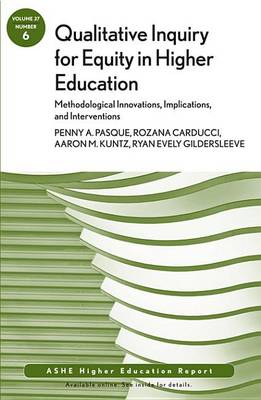J-B ASHE Higher Education Report Series (AEHE)
2 primary works
Book 111
Rethinking the "L" Word in Higher Education: The Revolution of Research on Leadership
by Adrianna Kezar, Rozana Carducci, and Melissa Contreras-McGavin
Published 7 November 2006
In these times of change and challenge in higher education, pleas for leadership have become frequent. However, the type of leadership required within this new context (of globalization, demographic changes, technological advancement, and questioning of social authority) may call for different skills, requiring a re-education among campus stakeholders if they want to be successful leaders. In the past twenty years, there has been a revolution in the way that leadership is conceptualized across most fields and disciplines. Leadership has moved away from being leader-centered, individualistic, hierarchical, focused on universal characteristics, and emphasizing power over followers. Instead, a new vision has emerged: leadership that is process-centered, collective, context-bound, non-hierarchical, and focused on mutual power and influence processes. This volume summarizes research and literature about new conceptualizations of leadership to inform practice. This is volume 31, number 6, of the ASHE Higher Education Report, a bi-monthly journal published by Jossey-Bass.
See our entire list of ASHE Higher Education Report titles for a wide variety of critical issues facing Higher Education today.
See our entire list of ASHE Higher Education Report titles for a wide variety of critical issues facing Higher Education today.
Book 165
Join the dialogue on the future of qualitative inquiry for equity in higher education. Beginning with the premise that equity is of paramount concern in the study of higher education, this text explores the promise and pitfalls of qualitative inquiry with respect to addressing issues of in/equity and fostering social change at micro, meso, and macro levels. Building upon contemporary qualitative higher education scholarship, the authors advance a critique of the reductive and generic conceptions of qualitative research that dominate the field and call upon scholars to examine the transformative potential embedded within critical qualitative inquiry. In addition to exploring the opportunities and tensions associated with engaging in critical qualitative inquiry, this monograph issues a call to action through intervention, describing strategies for challenging and resisting oppressive research norms that undermine the equity aims of higher education research. This is Volume 37 Issue 6 of the Jossey-Bass publication ASHE Higher Education Report.
Each monograph in the series is the definitive analysis of a tough higher education problem, based on thorough research of pertinent literature and institutional experiences. Topics are identified by a national survey. Noted practitioners and scholars are then commissioned to write the reports, with experts providing critical reviews of each manuscript before publication.
Each monograph in the series is the definitive analysis of a tough higher education problem, based on thorough research of pertinent literature and institutional experiences. Topics are identified by a national survey. Noted practitioners and scholars are then commissioned to write the reports, with experts providing critical reviews of each manuscript before publication.

